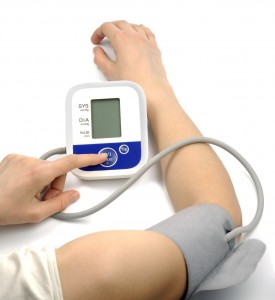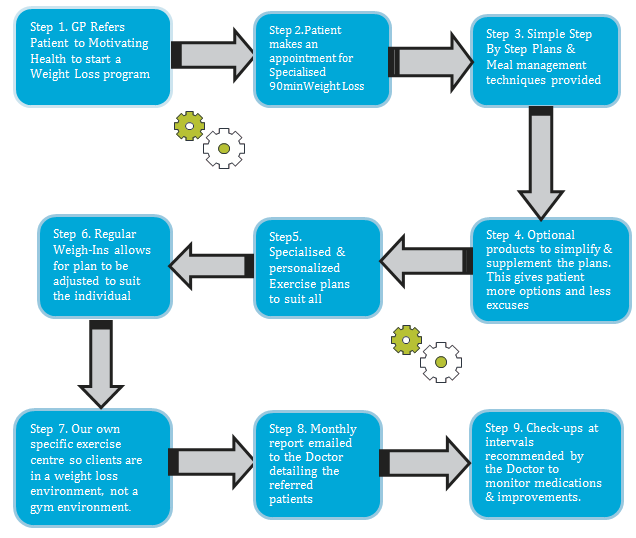An integrated weight loss program to help busy GP’s & their overweight patients!
As a busy GP we understand that your time with clients is precious and limited. We have spent a number of years perfecting a weight loss system that works for all ages and for most levels of mobility.
Our service is designed to take the burden off you as a GP and increase the chances of weight loss for your patients.
We know that for every kilo we help your patients lose, we make your job as a doctor less urgent.
We know that if you trust us and refer your patients into our program many of them:
- Lose weight.
- Experience reduced ankle & knee pain caused by arthritis.
- Lower their blood pressure – many will eventually come off their medication
- Lower their blood sugar levels – many will eventually come off their medication
- Lower their cholesterol levels – many will eventually come off their medication
- Live their life with a quality they may have considered a thing of the past.
Once someone enters our program we teach them how to turn on their Fat Burning!
Exercise
Exercise is important on so many levels. The level of exercise required for weight loss and general good health is quite often misunderstood. Our specialised exercise centre is designed for weight loss and we understand that each person is different. Particularly at the start of their program.
Some of the many things that need to be taken into consideration are:
- Age
- Pre-existing conditions such as Heart, Diabetes, Osteoperosis, Cancer etc
- Mobility issues from pre existing injuries or arthritis
- Medications
A surprising and often neglected side effect of exercise.
The most underestimated side effect of introducing exercising where possible to a weight loss program is the increase in mood and happiness of the participant. Through our work with our many clients in our exercise centre over the years is the overwhelming number of people who say “I just feel so much happier since I have started exercising again” or “I wasn’t looking forward to coming today but I am so glad I did, I feel so much better for it.
There is much reseach out there by psychologists that back up these comments.
How our program works
We know that by using the integrated approach and including the Doctor in a well designed program that compliance is greatly increased. Greater compliance increases the success of a weight loss program.
Here are just a few of the many tips we teach our clients about staying on track!
- Realistic expectations. Many fad diets and TV reality programs show people losing a large amount of weight each week. In reality a weight loss of 0.5 to 2kg a week is an achievable and maintainable goal.
- Planning your meals in advance and maintaining your food and exercise diary will keep you accountable of the foods you eat and helps you to stick to your program.
- Stick to a shopping list to avoid impulse purchases and purchasing foods that are not on the allowable food list.
- Always shop on a full stomach. It is easier to make the right choices when you are not hungry.
- Do not reward weight loss with ‘treats’. Rewarding yourself for losing weight by allowing yourself ‘treats’ will only slow your progress and inevitably lead to frustration.
- Remove as much food as practical from your home that is not on the allowable food list. Remember: “If it’s in your pantry it will be eaten”. Give food to charity, friends, throw it away, or pack long life foods away out of sight until you have reached your weight loss goal.
- Ensure you get a good nights sleep. Being well rested will ensure you’re not looking for extra energy from food.
- Ensure you have a good support network. Tell your friends and family that you are on the program, your reasons and motivations for doing it and how important your goals are to you. Ask them to be supportive and not offer you junk foods etc. as it only makes it harder for you.
- Keep a chart of your progress of fat/weight/centimetres lost, seeing your results proves that you can do it and will help to motivate you to continue the good work.
- After cooking, put away all excess food immediately to avoid unnecessary and unaccounted snacking.
- If making meals in advance split into correct serving sizes and refrigerate or freeze immediately.
- Have a goal and stick to it. While losing weight it is easy to fall into the ‘close enough’ thought pattern and let treats and temptation slip through, never reaching your true goal. ‘Close enough’ will never leave you feeling accomplished as reaching your goal.
- Avoid emotional eating. Breaking your diet because you are emotional will not only not make you feel better but can lead to feelings of guilt and regret making you feel worse in the end.
- Drinking a large glass of water before your meal will make you feel full and help to avoid over eating.

